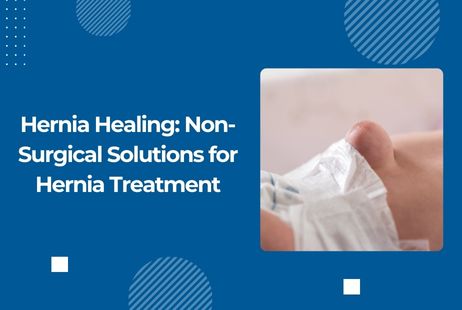
If you’re reading this blog, then you probably feel pain, discomfort, and a strange bulge in your abdomen or groin that wasn’t there before. Hernia is when an organ or tissue pushes through a weak spot in the surrounding wall.
So, if you are looking for a non-surgical solution for your hernia, read on and discover how we can help you heal yourself without surgery.
Signs of a Hernia Emergency
If you have a hernia, Contact Dr. Girish Juneja if you experience any of the following symptoms:
- Sudden, severe pain in the hernia site
- Nausea and/or vomiting
- Difficulty passing stool or gas
- Bloating or swelling of the abdomen
- Fever or rapid heart rate
- A bulge that does not go away or gets larger when you lie down or rest
Can Hernia Be Treated Without Surgery?
Hernias can be painful, uncomfortable, and sometimes dangerous if left untreated. But does that mean you need surgery to fix them?
Not necessarily. Different cases require different treatments, depending on how severe the symptoms are and how big the bulge is.
What Types of Hernias Can Be Treated Without Surgery?
Some small hernias that do not cause any symptoms or complications may not need treatment. Here are some examples of hernias that may be treated without surgery:
- Umbilical hernia:
This type of ventral hernia occurs near the belly button, where part of the intestine pokes through an opening in the abdominal wall.
Most umbilical hernias are congenital and may heal by themselves within a few years, especially in infants. However, some umbilical hernias may persist into adulthood and cause discomfort or complications. In these cases, surgery may be needed.
- Epigastric hernia:
This is another type of ventral hernia that occurs above the belly button, where fat tissue pushes through a gap between the two sides of the abdominal muscles.
About 3 percent of all abdominal hernias are epigastric hernias. Some babies are born with epigastric hernias, while others develop them in adulthood due to muscle weakness or strain. Many epigastric hernias are minor and do not cause symptoms.
- Hiatal hernia:
This type of hernia happens when the stomach bulges through a weak point in the muscle that separates the chest from the abdomen.
Hiatal hernias are common in older adults and are often linked to factors such as aging, pregnancy, overweight, and acid reflux. Most hiatal hernias are type I, where the place where the esophagus meets the stomach slides above the diaphragm.
These hernias may not cause symptoms or may cause heartburn and GERD. Treatment for hiatal hernias may include medication, lifestyle changes, or surgery in more severe cases.
It is important to consult an experienced specialist like Dr. Girish Juneja if you have a hernia and discuss the best treatment option for you.
Options for Hernia Treatment Without Surgery
There are some non-surgical treatment options for hernias, but they are not definitive and may have risks. Here are some of them in detail:
Wearing a hernia belt or truss:
This is a device that applies gentle pressure on the hernia and keeps it in place. Some benefits of this method
- It may reduce pain and discomfort,
- It can prevent the hernia from getting worse.
However, it does not fix the hernia or prevent complications such as strangulation or obstruction. It may also cause skin irritation, infection, or reduced blood flow to the area.
Taking medication:
This may include antacids, proton pump inhibitors, or pain relievers. The benefit of this method is:
- They may help with symptoms such as heartburn, acid reflux, or inflammation, especially for hiatal hernias.
However, they do not treat the underlying cause of the hernia or prevent it from growing.
Practicing lifestyle changes:
This method may include:
- Maintaining a healthy weight
- Avoiding heavy lifting
- Eating smaller meals
- Quitting smoking.
They may help reduce the pressure on the abdominal wall and prevent the hernia from worsening. However, they do not cure the hernia or reverse the damage.
The only permanent solution for most hernias is surgery, which can repair the defect in the muscle or tissue wall and prevent recurrence or complications.
Ease the Hernia Treatment by Choosing Dr. Girish
If you are suffering from a hernia and looking for a non-surgical solution, you may be disappointed to learn that there is no definitive cure without surgery.
But don’t worry; surgery does not have to be scary or painful. With the help of Dr. Girish, you can ease the hernia treatment by choosing a minimally invasive procedure that can fix your hernia with minimal pain, scarring, and recovery time.
Dr. Girish Juneja has successfully treated thousands of patients with different types of hernias. He uses the latest technology and techniques to ensure the best results and patient satisfaction.
So, what are you waiting for? Don’t let your hernia ruin your quality of life.
Contact Dr. Girish today and schedule a consultation.
